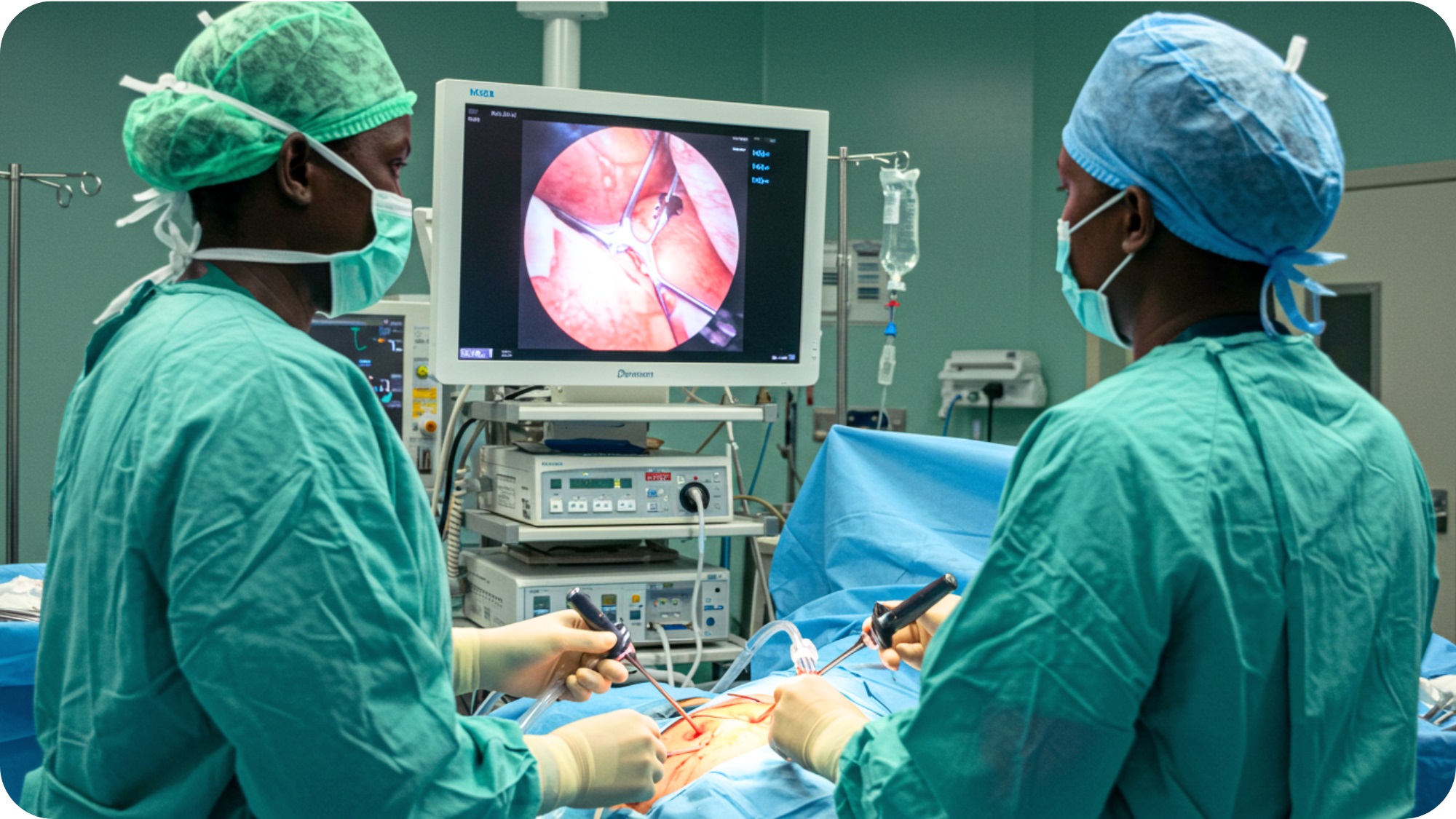
Laparoscopy
The future of surgery is here, and it is less invasive, more precise, and designed around a faster return to your life. Laparoscopic surgery, often called minimally invasive or “keyhole” surgery, has revolutionized the way we approach a wide range of medical procedures.
At Krown Hospital, our surgical teams are at the forefront of this advanced technique. Instead of a large open incision, laparoscopy uses a few tiny incisions and a specialized high-definition camera to perform complex operations with unparalleled precision. For our patients, this means less pain, minimal scarring, and a significantly quicker recovery.
Krown Hospital Advantage in Laparoscopic Surgery
-
Expertly Performed by Specialized Surgeons: Our team consists of certified surgeons and gynaecologists with extensive, fellowship-level training and experience in advanced laparoscopic techniques.
-
State-of-the-Art Surgical Suites: We have invested in the latest high-definition imaging systems and specialized laparoscopic instruments, giving our surgeons the crystal-clear visualization and tools they need to perform with the utmost precision.
-
The Gold Standard in Hospital Safety: By performing these procedures within the safety of Krown Hospital, we provide a level of care that standalone clinics cannot match, with board-certified anaesthesiologists and a full spectrum of medical support always on hand.
-
A Commitment to Faster Recovery: Our entire approach, from the surgical technique to our post-operative care, is designed to help you heal faster, experience less discomfort, and get back to your family and daily activities sooner.
Our Laparoscopic Specialties
Surgical & Gynaecology Laparoscopy Procedures
Our skilled teams routinely use laparoscopy to diagnose and treat a wide variety of conditions, offering a safer and less invasive alternative to traditional open surgery.
Common General Surgery Procedures:
-
Gallbladder Removal (Laparoscopic Cholecystectomy): The gold standard for treating gallstones and gallbladder inflammation.
-
Hernia Repair: A durable, less painful method for repairing inguinal, umbilical, and other types of hernias.
-
Appendectomy: A common emergency procedure to remove an inflamed appendix with minimal scarring.
-
Diagnostic Laparoscopy: A minimally invasive way to look inside the abdomen to diagnose the cause of pain or other issues when imaging is inconclusive.
Common Gynaecology Procedures:
-
Treatment of Endometriosis: To precisely remove endometrial implants, reducing pain and improving fertility.
-
Ovarian Cyst Removal (Cystectomy): To remove cysts from the ovaries while preserving healthy tissue.
-
Hysterectomy: Removal of the uterus through tiny incisions, offering a much faster recovery than the traditional open approach.
-
Myomectomy: The surgical removal of uterine fibroids, preserving the uterus.
-
Tubal Ligation: A permanent form of birth control performed with minimal discomfort.
Discover the Benefits of Minimally Invasive Surgery
If you have been told you need surgery, you may be a candidate for a less invasive laparoscopic procedure. We invite you to schedule a consultation with one of our expert surgeons to discuss your options and learn how we can help you on your path to recovery.
Frequently Asked Questions
-
What are the main advantages of laparoscopic surgery?
The primary benefits for patients are significantly less post-operative pain, much smaller incisions resulting in minimal scarring, a shorter hospital stay, and a much faster recovery and return to normal activities compared to traditional open surgery. -
Is laparoscopic surgery safe?
Yes, when performed by a specially trained and experienced surgeon, laparoscopy is an extremely safe and effective procedure. Our surgeons are experts in these advanced techniques. -
How long is the recovery period?
Recovery time varies depending on the specific procedure, but it is almost always significantly shorter than open surgery. Many patients are able to return home the same day or after a short hospital stay and are back to their normal routines within one to two weeks. -
Am I a candidate for laparoscopic surgery?
Many, but not all, conditions can be treated with laparoscopy. The best way to find out if you are a candidate is to have a thorough consultation with one of our surgeons, who will review your case and recommend the best approach for you.

